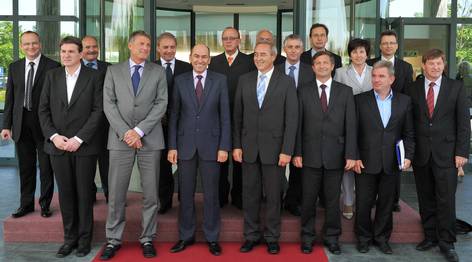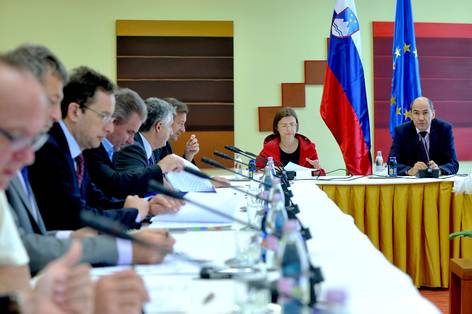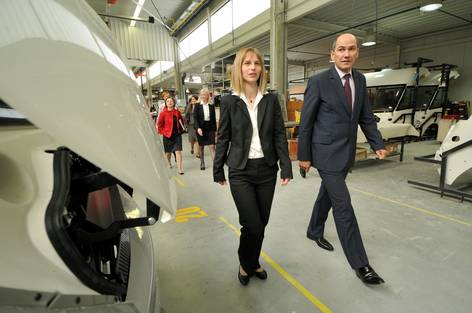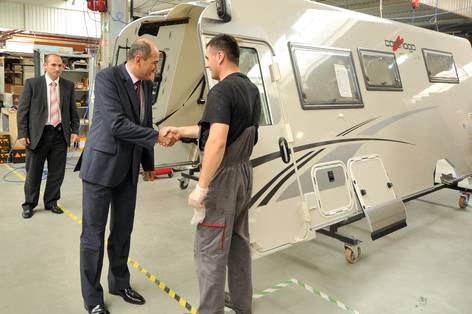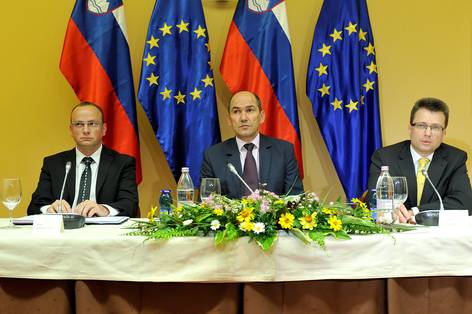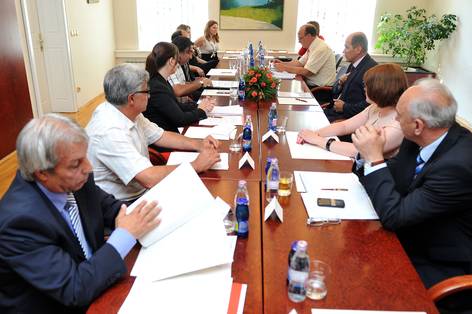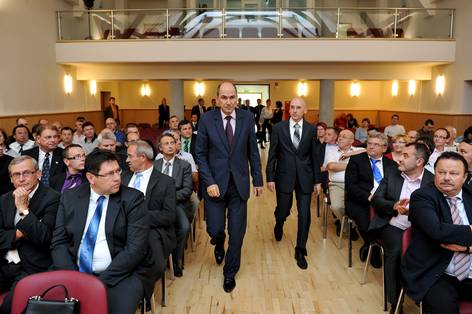NEWS
Prime Minister Janez Janša: in Pomurje there are ‘oases of optimism'
Following the Government’s consultative meeting held in the morning in Moravske Toplice, Prime Minister Janez Janša and his ministerial team today continued their visit to the Pomurje region. At the afternoon press conference, Mr Janša highlighted the difference between the Government's visit to the region during his previous term of office and the current one by stating that “at the time of our previous visit there was much more optimism based on positive trends and macroeconomic indicators, while the region also had more employed people and demonstrated positive economic growth; there was every indication that the region would start catching up with the Slovenian average development level. However, over the last three years of crisis, these trends, unfortunately, turned downward.” The Slovenian Prime Minister went on to say that many things achieved in good economic times have, much to his regret, been wrecked over the past three years; therefore “there is a need to make a fresh start”. Nevertheless, one can still find ‘oases of optimism’ in Pomurje, said Mr Janša. He also observed that nothing has changed here over the last three years in terms of hospitality by which the Pomurje region “certainly ranks first”.
At the working meeting held in the morning, the Slovenian Prime Minister and the Minister of the Interior, Vinko Gorenak, for the first time officially met with the representatives of the Hungarian national community in Slovenia. The participants of the meeting focused on the preparation of an umbrella law on national communities, and the problems pertinent to the financing of these communities and obtaining EU funds. They also pointed out that that the number of cases involving hate speech directed against minorities is increasing. In respect of this burning issue they shared the opinion that this is a wider problem which can also be perceived at the national level, and pointed out that hate speech should be condemned, regardless of whom it is directed against. During the talks, Prime Minister Janša explained that minority communities are one of the few in respect of which the proposed austerity measures do not envisage any changes in their funding.
In Odranci, the Slovenian Prime Minister, accompanied by the Minister of Economic Development and Technology, Radovan Žerjav, met with the management of Carthago and made a tour of its production facilities. Last year, the company manufactured 1,500 mobile homes, thus recording the highest growth in its production since 2008. Carthago is also an example of good practice and development based on foreign direct investments. Prime Minister Janša welcomed the company’s plans related to investments in the region and thanked the company’s representatives for their efforts also aimed at supporting wider regional environment. ”However, 421 new jobs is what counts most”, Mr Janša said during the talks with the company's management.
At the press conference held in the afternoon, the Slovenian Prime Minister highlighted certain companies from Pomurje, which the Government visited over the last two days, and said that while operating successfully, these companies have adapted to the crisis and designed promising plans for the future.
In his view, the Pomurje region is faced with two crucial problems, i.e. the problem of funding sources and the problem of administrative obstacles. In this context, Mr Janša emphasised that although the Slovenian Government, in its revised budget, left funds earmarked under the Pomurje Act untouched, their amount does not suffice for further development of the region. In his view, the largest source of funding and the greatest opportunity to ensure a faster development of the region are above all EU cohesion funds. These are actually the only funds one can realistically expect to obtain until 2020. In this respect, Mr Janša also explained that within the next Multi-annual Financial Framework, the Pomurje region will belong to the East Cohesion Region, which will have several hundreds of million Euros at its disposal over the coming eight years. With regard to the allocation of these funds, the Government adopted a strategic decision at today’s consultative meeting, meaning that in allocating the funds, it will consider development gaps within the East Cohesion Region, which is in itself also characterised by large differences between certain municipalities, regions and statistical regions. In Prime Minister’s view, this decision will enable everyone to be more optimistic about the future, should the differences in the levels of development be eliminated and the reference opportunities in Slovenia equalised.
At the press conference, Prime Minister Janez Janša also talked about a set of problems involving administrative obstacles, stating that these are obstacles which prevent entrepreneurs and legal entities from developing available potentials and starting to work towards fostering growth and creating new jobs. The Prime Minister in particular called attention to specific cases presented to the Government during the visit. Although in these cases investment plans, business ideas and financial resources are all in place, the projects have nevertheless not been implemented, because “somebody has not taken a timely decision regarding the change in the intended land use, procedures for obtaining building permits, municipal spatial plans, etc.” In this regard, the Prime Minister stressed that administrative obstacles represent a complex problem not only typical of the Pomurje region but of the whole of Slovenia. In this context, he highlighted a one week deadline given after today's consultative meeting to the ministries to prepare the lists of all matters pending at first or second instance, before bodies affiliated to ministries and regulatory authorities. Moreover, the Prime Minister announced that the Government will deal with the full lists of pending matters in two weeks time. These lists will include all pending matters, their stage of procedure and the responsible person. According to the Prime Minister, administrative obstacles are indeed one of those factors which impede the development and “which we can resolve or eliminate alone. It is us who must therefore deal with this problem, because it was not caused by the economic crisis.”
Later in the visit, the Prime Minister and the Minister of the Interior, Vinko Gorenak, for the first time officially met with the representatives of the Roma community. They discussed regulatory framework applicable to the Roma communities in Slovenia, and addressed the issues of legalisation of their residence, financing in the field of EU projects and cases of hate speech. They also agreed that the Roma community should participate in the processes of resolving the associated topical issues.
Finally, the Prime Minister, together with the Minister of Finance, Janez Šušteršič, the Minister of Agriculture and Environment, Franc Bogovič, the Minister of Infrastructure and Spatial Planning, Zvone Černač, and the Minister of Defence, Aleš Hojs, met with the mayors, business representatives, deputies and national councillors from the Murska Sobota and Gornja Radgona area. The participants discussed specific challenges faced by the region, and highlighted environmental restrictions making economic development less effective than it might have been. By presenting incentives and posing questions to the representatives of the Government, the participants from Pomurje called attention to specific problems faced by entrepreneurs and tradesmen, including problems related to the existing administrative obstacles preventing the implementation of ideas in cooperation with foreign investors, exploitation of energy potentials and the protection of the Mura River. This also applies to the price of wood and the necessary measures that should be taken in the timber industry, to agriculture, drinking water, change in the intended land use and to fire-fighting service.
The discussion also focused on measures proposed within the framework of the Fiscal Balance Act. According to the Prime Minister, “this step is the foundation on which we can build.” He went on to say that since Slovenia’s independence, this was for the first time that a high level of national consensus concerning austerity measures was reached, a consensus reached in respect of “steps which are indeed not simple.”
“These measures mean a psychological shift in the Slovenian mind that promises a higher level of cooperation, one which may also be expected in making further steps”, the Prime Minister added at the Government’s consultative meeting. He also stressed that in July, the Government will be adopting a new package of measures aimed at improving the business environment. Upon the conclusion of the meeting, the Prime Minister noted that regardless of many efforts made thus far, no major shifts may be expected within a very short time. ”As you know: if you sow little, you will reap little. It is now time to reap; we will sow next year. We should keep this in mind”, the Prime Minister said on concluding his visit to Pomurje.




